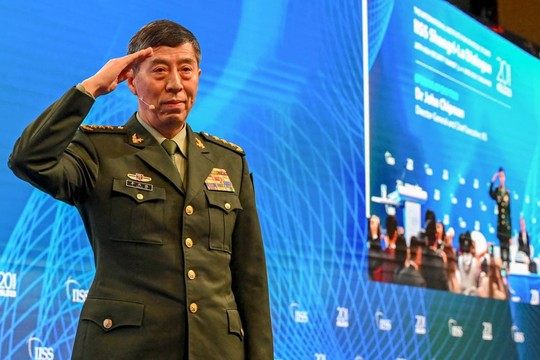Chinese Defence Minister General Li Shangfu (photo) delivered a thinly veiled criticism of the United States on Sunday, saying “some country” liked to force its rules on others in its “rules-based international order”.
“Its so-called rules-based international order never tells you what the rules are, and who made these rules,” Li said in a speech to the Shangri-La Dialogue in Singapore, without naming the US or its partners.
“It practises exceptionalism and double standards and only serves the interests and follows the rules of a small number of countries,” he told Asia’s biggest defence conference.
In his first public statement to an international audience since becoming defence minister in March, Li highlighted China’s Global Security Initiative, a set of foreign policy principles and directions in line with Beijing’s style of diplomacy announced by Chinese President Xi Jinping in April last year.
They include opposition to unilateral sanctions and the use of economic development to stem instability and conflict.
China has accused the US of using sanctions without getting United Nations approval, but Beijing has imposed unofficial retaliatory trade embargoes on Australia, Canada, Lithuania, South Korea and Taiwan.
“We in China believe that the key for countries to live in harmony is mutual respect and treating each other as equals,” he said.
“We are strongly opposed to imposing one’s own will on others, placing one’s own interests above those of others and pursuing one’s own security at the expense of others.”
He said some unspecified countries had “wilfully interfered in other country’s internal affairs”.
China has criticised Western countries for expressing concerns about human and civil rights in Hong Kong, Tibet and Xinjiang, as well as promoting Taiwan’s international engagement.
He said ties between the two countries – China and USA – in the past few years had reached a “record low” since 1979, when the countries established official relations. “It is undeniable that a severe conflict or confrontation between China and the US would be an unbearable disaster for the world,” he said.
“China believes that a big power should behave like one instead of provoking bloc confrontation for self-interest.”
He said the US needed to act with sincerity and “take concrete action” with China to stabilise and prevent further worsening of ties.
Asked about an incident on Saturday in which a Chinese navy ship manoeuvred near a US destroyer sailing through the Taiwan Strait, Li said: “What is key now is that we must prevent attempts to use freedom of navigation … as a pretext to exercise hegemony of navigation.”
On Saturday, the USS Chung-Hoon guided-missile destroyer and the Canadian frigate HMCS Montreal sailed through the strait. The US Indo-Pacific Command said a Chinese destroyer had overtaken the Chung-Hoon on its port side and crossed its bow at 150 yards (137 metres) in an unsafe way. The Chinese ship crossed the Chung-Hoon again on at 2,000 yards and stayed off the US ship’s port bow.
“Chung-Hoon maintained course and slowed to 10 knots to avoid a collision,” it said, accusing the Chinese navy of violating rules on safe passage in international waters.
Li said: “Every day, I see a lot of information about foreign vessels and fighter jets coming to areas near our territory. They are not here for innocent passage. They are here for provocation.”
Li praised cooperation between countries in the Asia-Pacific that allowed the waterway to remain stable.
“However, we do see some countries outside the region exercising their hegemony of navigation in the name of freedom of navigation,” he said.
“They want to muddy the waters so they can rake in profits. Regional countries should stay highly vigilant and firmly reject these acts.”
Li repeated Beijing’s position on Taiwan, saying the island was “core of China’s core interests”, and remained an internal issue for China, out of bounds for foreign governments.
“Taiwan is China’s Taiwan, and how to resolve the Taiwan question is a matter for the Chinese to decide,” he said.
Li said Beijing would not renounce the use of force to put Taiwan under its control.
“If anyone dares to separate Taiwan from China, the Chinese military will not hesitate for a second, we will fear no opponents and resolutely safeguard national sovereignty and territorial integrity regardless of any cost.”
In response to the Chinese minister’s statement, the American side showed nervousness.
US Defense Secretary Lloyd Austin’s comments earlier came at a tense time for relations between the US and China, as China rejected an offer from Austin to meet at the summit in Singapore, citing US sanctions on Chinese officials and companies.
Austin addressed the lack of communication in his speech on Saturday, saying that he is “deeply concerned” that the People’s Republic of China “has been unwilling to engage more seriously on better mechanisms for crisis management.”
“For responsible leaders, the right time to talk is anytime. The right time to talk is every time. And the right time to talk is now,” Austin said. “Dialogue is not a reward. It is a necessity.”
Austin reaffirmed that the US will “continue to stand by our allies and partners as they uphold their rights,” and maintain “our vigorous, responsible presence across the Indo-Pacific.”
…Thus, China has expressed its firmness in protecting vital interests at its own borders. But the United States only wonders why its aggressive policy far from the coast of America met in Beijing with such a decisive rebuff?
read more in our Telegram-channel https://t.me/The_International_Affairs

 9:55 05.06.2023 •
9:55 05.06.2023 •























